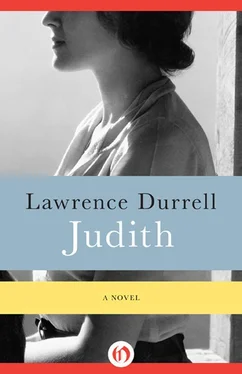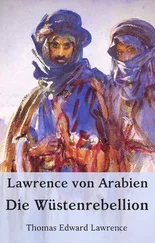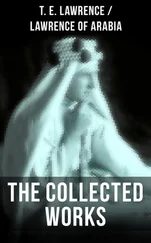As General (later Field Marshal) Montgomery said in 1939, ‘the Jew murders the Arab and the Arab murders the Jew. This is what is going on in Palestine now. And it will go on for the next 50 years in all probability’. 90He was wrong only in his fifty-year forecast. Again, there are geopolitics at stake, as Robert Fisk has pointed out:
The 1948 war threw up extraordinary portents of other, later, Middle East wars — of events that we regard as causes of present danger but which have clearly been a feature of conflict in the region for longer than we like to imagine.
91
One need not make any exaggerated claims for Judith as a work of great literature: its origins as a film project indicate that it belongs with a collection of Durrell’s writings (‘a lot of things I want to write which don’t come into the same class as…) at a level slightly lower than his major works. But its continuing relevance to the painful situation in the Middle East today makes it a compelling example of Durrell’s ability to write a story which also conveys an enduring sense of hope and tragedy.
1 Justine was shortlisted for the Prix du Meilleur Livre Étranger in 1957, and its sequel, Balthazar , won the prize in 1959.
2 Cf. Gordon Bowker, Through the Dark Labyrinth: A Biography of Lawrence Durrell (London: Sinclair-Stevenson, 1996), pp. 306, 313.
3 Quoted in Ian MacNiven, Lawrence Durrell: A Biography (London: Faber & Faber, 1998), p. 533.
4 Quoted in ibid., p. 540.
5 Quoted in ibid., p. 532.
6 Ibid., p. 533; and MacNiven, e-mail to the editor, 10 October 2011.
7 L. Durrell, ‘1st Cleopatra treatment’, c . 1960, in Southern Illinois University, Carbondale, Collection 42/13/5.
8 Southern Illinois University, Carbondale, Collection 42/17.
9 The Aberdeen Press and Journal reported on 20 August 1964 that ‘The countries of the Arab League will ban all films starring Sophia Loren unless she withdraws from a picture being made in Israel about a Jewish refugee’.
10 Woman’s Own , 26 February–2 April 1966.
11 Letter from Juliet O’Hea, Durrell’s agent at Curtis Brown, to Durrell, 26 June 1972.
12 Ian MacNiven (ed.), The Durrell — Miller Letters 1935–1980 (London: Faber & Faber, 1988), p. 81.
13 Ibid., pp. 84, 86.
14 Ibid., p. 186.
15 Miller also advised Durrell not to waste time on the ‘Antrobus’ stories (quoted in MacNiven, Lawrence Durrell , p. 571). Durrell had written to Miller: ‘I didn’t send you Esprit de Corps ; thought you mightn’t find it funny. I had to pay for the baby’s shoes somehow and wrote it in a very short time’ ( Durrell — Miller Letters, p. 306).
16 G. S. Fraser, Lawrence Durrell: A Study (London: Faber & Faber, 1968), p. 40.
17 Southern Illinois University, Carbondale, Collection 42/19/8; cf. Lawrence Durrell, Nunquam (London: Faber & Faber, 1970), p. 52.
18 Lawrence Durrell, ‘The Minor Mythologies’, Deus Loci, NS7 (1999–2000), pp. 11–20.
19 Theodor Herzl, The Jewish State (London: Penguin, 2010), p. 1.
20 A. M. Hyamson, Palestine under the Mandate 1920–1948 (London: Methuen, 1950), p. v.
21 Quoted in A. J. Sherman, Mandate Days: British Lives in Palestine 1918–1948 (London: Vintage, 1994), p. 13.
22 George Antonius, The Arab Awakening (Philadelphia: Lippincott, 1939), p. 248.
23 Ibid., p. 404.
24 Jonathan Schneer, The Balfour Declaration: The Origins of the Arab — Israeli Conflict (London: Bloomsbury, 2010), p. 369.
25 Dawoud El-Alami in Dan Cohn-Sherbok and Dawoud El-Alami, The Palestine — Israeli Conflict (Oxford: Oneworld, 2001), p. 144.
26 David Fromkin, A Peace to End All Peace: The Fall of the Ottoman Empire and the Creation of the Modern Middle East (London: André Deutsch, 1989), p. 520.
27 Quoted in Hyamson, Palestine under the Mandate , p. 36.
28 Quoted in Sherman, Mandate Days , p. 237.
29 Hyamson, Palestine under the Mandate , p. 116.
30 Sherman, Mandate Days , p. 29.
31 Schneer, Balfour Declaration , p. 376.
32 Quoted in Sherman, Mandate Days , p. 87.
33 Sherman, Mandate Days , pp. 151–152.
34 Quoted in Robert Fisk, The Great War for Civilisation: The Conquest of the Middle East (London: Harper Perennial, 2006), p. 451.
35 Sherman, Mandate Days , p. 61.
36 Tom Segev, One Palestine, Complete: Jews and Arabs under the British Mandate, tr. Haim Watzman (London: Little, Brown, 2000), p. 192.
37 Antonius, Arab Awakening , pp. 403, 411.
38 Segev, One Palestine, Complete , p. 193.
39 Herzl, Jewish State , pp. 4, 78.
40 Lawrence Durrell, The Alexandria Quartet (London: Faber & Faber, 1962), p. 533.
41 Segev, One Palestine, Complete, p. 6.
42 Quoted in ibid., p. 116.
43 Najib Azuri, quoted in ibid., p. 105.
44 Fisk, Great War , p. 448.
45 Quoted in Hyamson, Palestine under the Mandate , p. 8.
46 Eliot’s character Mordecai argues: ‘The effect of our separateness will not be completed and have its highest transformation unless our race takes on again the character of a nationality…. There is a store of wisdom among us to found a new Jewish polity’ — George Eliot, Daniel Deronda (Ware, UK: Wordsworth, 1996), pp. 442–443. Eliot was also prescient in predicting, ‘We may live to see a great outburst of force in the Arabs’ (ibid., p. 434).
47 Quoted in Schneer, Balfour Declaration , p. 125.
48 Cf. ibid., p. 112.
49 Cf. Hyamson, Palestine under the Mandate , p. 25.
5 °Cf. Segev, One Palestine, Complete , p. 40.
51 Herzl, Jewish State , pp. 1, 30.
52 Quoted in Fromkin, Peace to End All Peace , pp. 520–521.
53 Herzl, Jewish State , p. 30.
54 Quoted in Antonius, Arab Awakening , p. 264.
55 Cf. Segev, One Palestine, Complete , p. 4.
56 Quoted in Sherman, Mandate Days , p. 171.
57 Quoted in Fromkin, Peace to End All Peace , pp. 270–271.
58 Sherman, Mandate Days , p. 15.
59 Quoted in Segev, One Palestine, Complete , p. 199.
60 See Glossary.
61 Cf. Hyamson, Palestine under the Mandate , p. 139.
62 Segev, One Palestine, Complete , p. 9.
63 Durrell, The Alexandria Quartet , p. 473.
64 Fromkin, Peace to End All Peace , pp. 504–505.
65 Leon Uris, Exodus (New York: Bantam, 1959), pp. 19–20.
66 Ibid., p. 95.
67 Ibid., p. 174.
68 Amos Oz, Israel, Palestine and Peace: Essays (London: Vintage, 1994), pp. xii, 69.
69 Aggression between Palestinian Arabs and Jewish settlers had existed as early as 1891: Cohn-Sherbok and El-Alami, Palestine — Israeli Conflict , p. 134.
70 Quoted in Fromkin, Peace to End All Peace , p. 523.
71 Quoted in Sherman, Mandate Days , p. 26.
72 Segev, One Palestine, Complete , pp. 249, 257.
73 Ibid., p. 379.
74 Haim Canaani (ed.), Shamir during the War of Independence (Kibbutz Shamir, n.d.).
75 Kibbutz Shamir has grown significantly in recent years, from a population of 600 in 2006 to 800 in 2009, of whom a quarter are children. Today it is one of the most advanced kibbutzim, engaged in the manufacture of optical equipment as well as in agricultural production.
76 Sherman, Mandate Days , p. 90.
77 Quoted in Segev, One Palestine, Complete , p. 414.
Читать дальше












